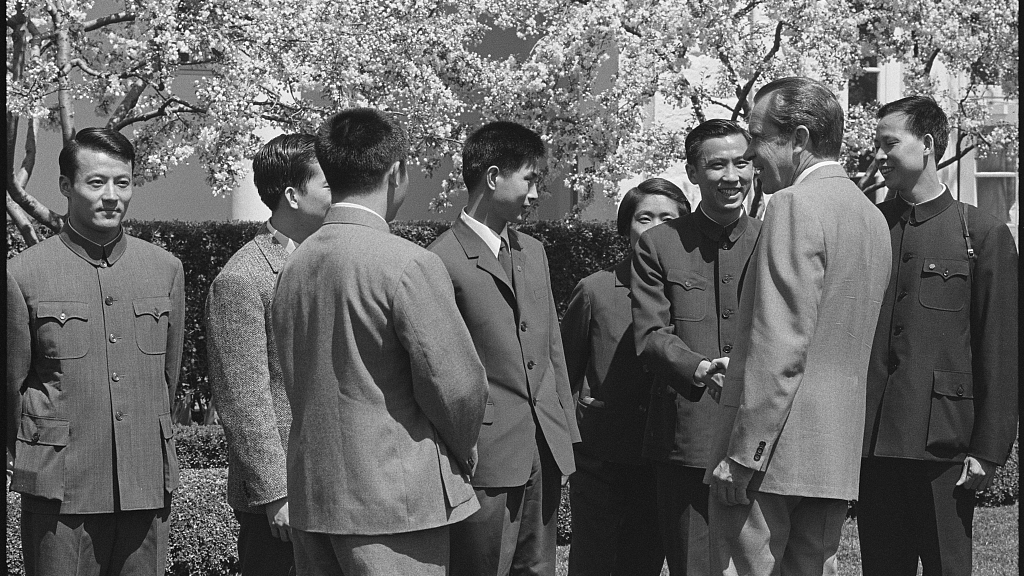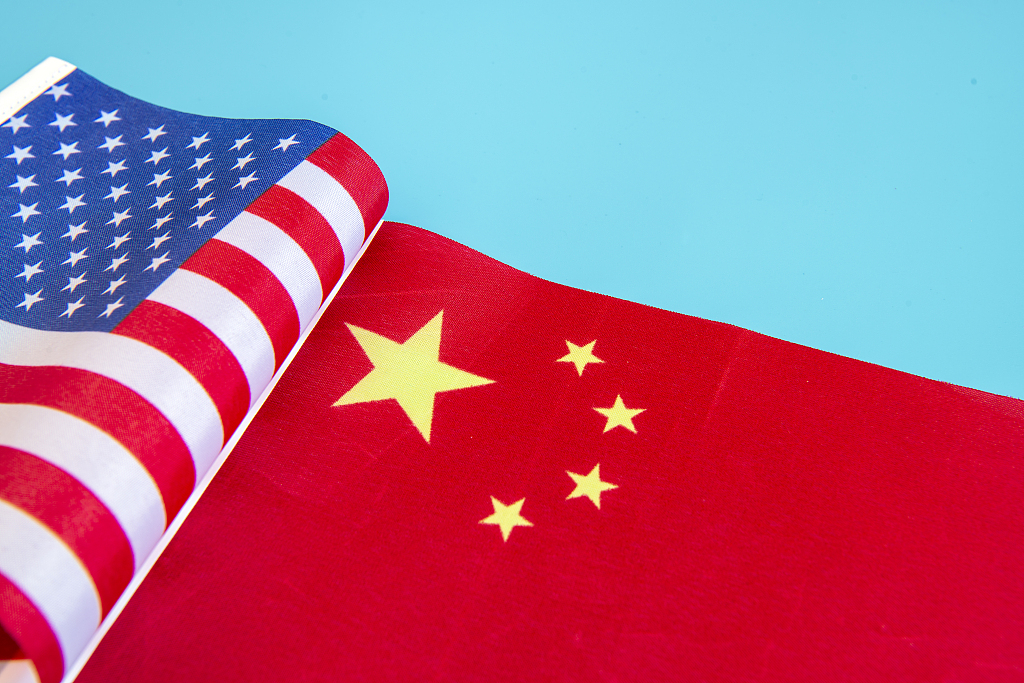
Members of the Chinese national table tennis team shake hands with U.S. President Richard Nixon on the lawn of the White House, Washington, D.C., U.S., April 18, 1972. /VCG
Members of the Chinese national table tennis team shake hands with U.S. President Richard Nixon on the lawn of the White House, Washington, D.C., U.S., April 18, 1972. /VCG
Editor's note: Hannan Hussain is a foreign affairs commentator and author. He is a Fulbright recipient at the University of Maryland, the U.S., and a former assistant researcher at the Islamabad Policy Research Institute. The article reflects the author's opinions and not necessarily the views of CGTN.
On February 24, Chinese Ambassador to the United States Qin Gang delivered a keynote speech at the Commemoration for the 50th Anniversary of President Richard Nixon's visit to China. "The two leaders [Chairman Mao Zedong and President Nixon] ... put the interests of their nations and peoples before the differences in ideology and political system to end over two decades of antagonism and hostility, and opened the gate of China-U.S. relations," remarked Qin.
By emphasizing pragmatic diplomacy of the past and offering insights on the all-important Taiwan question, Qin's remarks emerge substantially relevant to the current state of the Sino-U.S. relationship.
On the value of political courage, for instance, he built on President Nixon's receptivity to Chairman Mao's 1971 invitation: to host the U.S. table tennis team in China. That gesture appealed to the possibilities of practical relations on both sides and inspired Nixon to prepare future ground for his landmark visit to the People's Republic of China.
The key takeaway is reciprocity. At present, the Sino-U.S. relationship should benefit from an advancement of that reciprocal practice, where one side's calls for cooperation and improving ties are acknowledged on their merits, and not resisted through a Cold War view. The latter promises nothing but confrontation, hostility or estrangement. In fact, in his keynote speech, Qin pointed to the impossibility of both countries to remain in any of the three states. His rationale is compelling because it reads both countries' statuses as world leading economies as one of the key factors contributing to that outcome. Given the interconnectivity that comes with their combined economic heft, confrontation between the two could render global stability a casualty. Alternatively, "communication and dialogue" carries the promise of illuminating pathways to serve bilateral and global interests.
Interestingly, Thursday's speech had a vital message for keen observers of the consequential relationship: don't underestimate the range of complimentary Sino-U.S. interests at present. Millions of jobs in both countries, Ambassador Qin noted, are supported by trade that stands in excess of the $750 billion annual mark. On a global level, Beijing and Washington have revealed some common aspirations when pursuing certain key challenges – from energy security to climate change.

In light of these consistencies, will confrontation or narrowly defined competition inject any value into future Sino-U.S. convergence? History suggests true optimism could stem from remaining in conversation with each other, emblematic of the hope that President Nixon expressed 50 years ago.
On the critical question of the Taiwan question, Qin called on Washington to "honor its commitments" and cooperate with China to contain "Taiwan independence" separatist forces.
The unfortunate reality is that despite repeated assurances, Washington has shown little in support of its commitment to the one-China principle. Unwarranted arms sales to Taiwan have seriously violated the provisions of the three China-U.S. joint communiques, and U.S. persists in its unjustified push for so-called diplomacy with the island, despite very stern warnings sent its way. In public, U.S. President Joe Biden has gone on to pronounce the Chinese region as "independent," when successive U.S. administrations have known very well about the centrality of the one-China principle to Sino-U.S. ties.
All considered, such provocations communicate an unwarranted message of encouragement – not containment or firm opposition – to "Taiwan independence" separatists. They represent a particularly compromising look for Washington's one-China stand, because these very separatists are those who are against China's peaceful reunification. Make no mistake: achieving that reunification in its entirety is the will of the Chinese people.
Ultimately, history proves a valuable guide for reform in bilateral ties but informing progress means prioritization of mutual respect, peaceful competition and adherence to foundational principles of the relationship.
In former U.S. Secretary of State Henry Kissinger's telling, peaceful discussion between "these two great societies" is the key to the international order.
Thus, a highly consequential relationship demands highly consequential choices.
(If you want to contribute and have specific expertise, please contact us at opinions@cgtn.com.)

